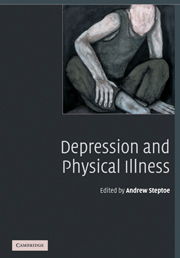Book contents
- Frontmatter
- Contents
- List of contributors
- Preface
- Part 1 Introduction to depression and its determinants
- Part 2 Depression and specific health problems
- Part 3 Biological and behavioural processes
- Part 4 Conclusions
- 18 Integrating clinical with biobehavioural studies of depression and physical illness
- Index
- References
18 - Integrating clinical with biobehavioural studies of depression and physical illness
from Part 4 - Conclusions
Published online by Cambridge University Press: 17 September 2009
- Frontmatter
- Contents
- List of contributors
- Preface
- Part 1 Introduction to depression and its determinants
- Part 2 Depression and specific health problems
- Part 3 Biological and behavioural processes
- Part 4 Conclusions
- 18 Integrating clinical with biobehavioural studies of depression and physical illness
- Index
- References
Summary
Depression and health outcomes
The chapters in Part 2 of this book addressed the relationship between depression and specific conditions, including coronary heart disease (CHD), diabetes, cancer, chronic pain and obesity. There is also research linking depression and depressed mood with a number of other health outcomes, including acquired immunodeficiency syndrome (AIDS)-related mortality [1], hospitalisation and death in patients with end-stage renal disease [2], and death among patients with Parkinson's disease [3]. In some of these conditions, depression is associated with worse outcomes, but this is not always the case. As noted in Chapter 10, evidence linking depression with poor outcome in cancer is inconclusive, and Stage et al. [4] have reported in a small study of chronic obstructive pulmonary disease that depressive illness was associated with reduced rather than greater mortality. Some studies have suggested that insulin resistance (a risk factor for CHD and diabetes) is protective against depression [5, 6].
There are two other common chronic conditions in which depression has been studied quite extensively, and these merit fuller discussion since they have not been the subject of separate chapters in this book. The first of these is stroke. Since the pathophysiology of many types of stroke closely resembles that of coronary artery disease, it is perhaps not surprising that associations between depression and future stroke have been identified.
- Type
- Chapter
- Information
- Depression and Physical Illness , pp. 397 - 408Publisher: Cambridge University PressPrint publication year: 2006
References
- 4
- Cited by

